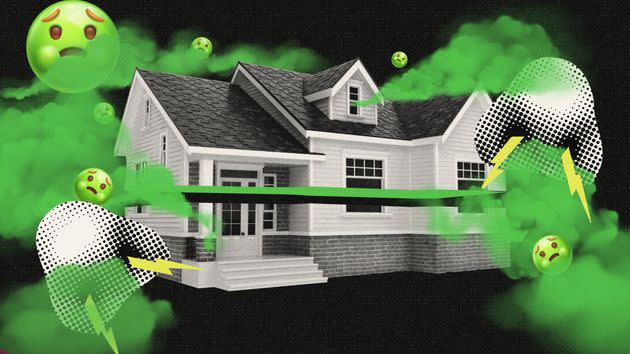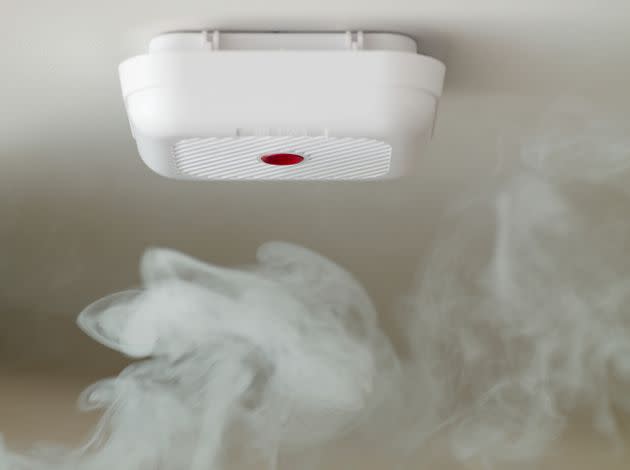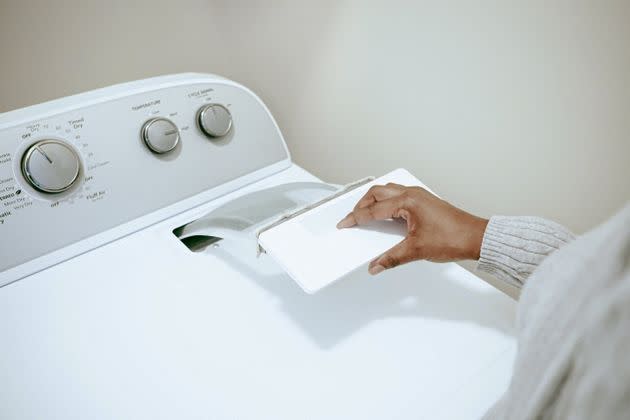The 8 House Smells You Should Never, Ever Ignore

It's important to know which odors are warning signs of more serious health issues.
A lingering, bad smell in your home can be a frustrating headache to deal with ― and sometimes it could also be a sign of something more serious.
It’s important to know the difference between the everyday annoyances of rotting produce in your fridge and the hazardous odors that could be an indicator of a much deeper issue. There are some odors that are not just unpleasant, but potentially dangerous to sniff in a home. If left unchecked, these kinds of smells can lead to health risks, costly repairs and damage.
Here are the odors that home repair, plumbing and heating experts say you should never ignore:
1. Smoke

If your smoke alarm starts beeping, don't ignore the warning.
Where there is smoke, there could be fire. Courtney Klosterman, home insights expert at Hippo, said if you smell smoke, you should investigate its source immediately.
“The smell of smoke, even when you’re not cooking or burning anything, could indicate a fire hazard hidden within walls or in the attic, or nearby the exterior of the home,” she said.
2. Rotten Egg Smell In The Air
“Natural gas is odorless, so utility companies add a sulfur-like or rotten egg smell to alert you of a gas leak,” Klosterman said.
So if you’re smelling rotten egg smell in the air of your home, that’s a serious concern. Natural gas leaks can lead to explosions or poisoning. If you detect this smell, turn off the gas if you can do so safely, and call your gas company immediately.
Philadelphia-based plumber Kelly Ireland recommends having a gas leak detector on hand so that you can check if it is a foul grease smell or a gas leak smell.
3. Sewage Smells From Your Bathroom
Ireland said that if you encounter this foul smell, you should immediately check your traps, because it could be a problem with your sewage line or trap. A P-trap is a U-shaped pipe underneath your sink or drain that is meant to trap water.
Ireland said the sewage smell issue often comes from unused guest bathrooms.
“When that trap dries out, it allows a gas smell to go in,” she said. “So really all you need to do with that is every other week, maybe turn the water on, fill that trap up.“
If you continue to ignore the sewage smell, it can not only be unpleasant, but hazardous to your health, Klosterman said.
4. Persistent Urine Smells From Your Toilet
Ireland said the smell of ammonia or urine could be a sign of a broken wax ring at the base of your toilet. The wax ring is supposed to be the watertight seal that prevents sewer gas from coming out into the room.
“It could be oozing out underneath the toilet and you don’t realize that it’s oozing out until either you have a spot on your ceiling, or it starts coming out from the bottom of your toilet,” Ireland said.
“When I go into a bathroom and I smell that, I always check to see if the toilet is rocking. Because usually if it’s rocking, it’s a sure sign that you have a broken wax ring,” Ireland added.
5. Rotten Egg Smell From Your Running Water

Your shower water should not have an odor.
If you always smell a rotten egg smell when running your shower water, your water heater could be breaking down, Ireland said.
“If you start smelling that smell, it means the metals on the inside of the water heater are breaking down. So usually you’ll have to replace parts, like anode rods,” Ireland said.
Once your water heater starts breaking down, you may soon start dealing with lukewarm water that does not heat up properly, so don’t ignore this sign.
Addressing the issue sooner “saves you from that giant bill of like, ‘Oh well, I waited too long and now the water heater’s leaking because the insides corroded so much that now it doesn’t hold,’” Ireland said.
6. Musty Or Moldy Smells
“A home with a musty or moldy smell often indicates the presence of mold or mildew, which thrives in damp environments. This can be a health risk, especially for those with allergies or respiratory issues,” Klosterman said.
Ireland said if you notice “a weird musty smell,” the cause is often a slow leak happening inside the walls of your home. Look for yellowish spots on your wall and splitting at the seams of drywall, because those are signs of the water source, she said.
You don’t want to let mold freely grow. Klosterman noted that whether or not your home insurance policy will cover your mold outbreak can depend on the homeowners’ role in maintaining the home, which is why it’s important to do regular home maintenance.
7. Burning Smells Around Appliances Like Your Dryer

When was the last time you cleaned your dryer's filter? If you are smelling a burning odor from your dryer, your lint filter is often the cause.
Klosterman said a burning smell could indicate an electrical fault in your appliances, wiring or outlets, and in worst-case scenarios, these faults could lead to electrical fires. Take your clothes dryer, as one common example.
“If there’s a burning smell, that means the lint needs to be cleaned out of that [dryer]. You don’t want that to catch on fire,” said Duane Enoch, owner of Green Air Concepts Heating and Air Conditioning in Ardmore, Pennsylvania.
You should regularly be cleaning your dryer’s lint filter and dryer vents, because a failure to clean was the leading cause of why clothes dryer fires happened in U.S. homes from 2018‑2020, according to the U.S. Fire Administration.
“If you smell burning plastic or any electrical odor without an identifiable source, disconnect power and contact an electrician,” Klosterman said. “Take time to familiarize yourself with the location of the electrical circuit breakers in the home. Each breaker should be individually labeled to designate the area where electricity is being channeled.”
8. Sweet, Syrupy Smells From Your Air Conditioning Unit
Sometimes, hazardous smells can be sweet.
“An unusual, sweet smell could indicate a coolant leak from your refrigerator or air conditioning unit. This requires immediate attention to prevent the unit from failing and to avoid the potential spread of refrigerant, which can be harmful,” Klosterman said.
That’s why Klosterman said you should clean your filters every season in air conditioning and heating units, and vacuum refrigerator coils every six months to remove debris that could contribute to wear and tear.
Ultimately, these smells are warning signs of larger hazards that should not be ignored. So the next time you smell something weird and funky from an unknown source, don’t ignore it ― start paying attention.

 Yahoo News
Yahoo News 